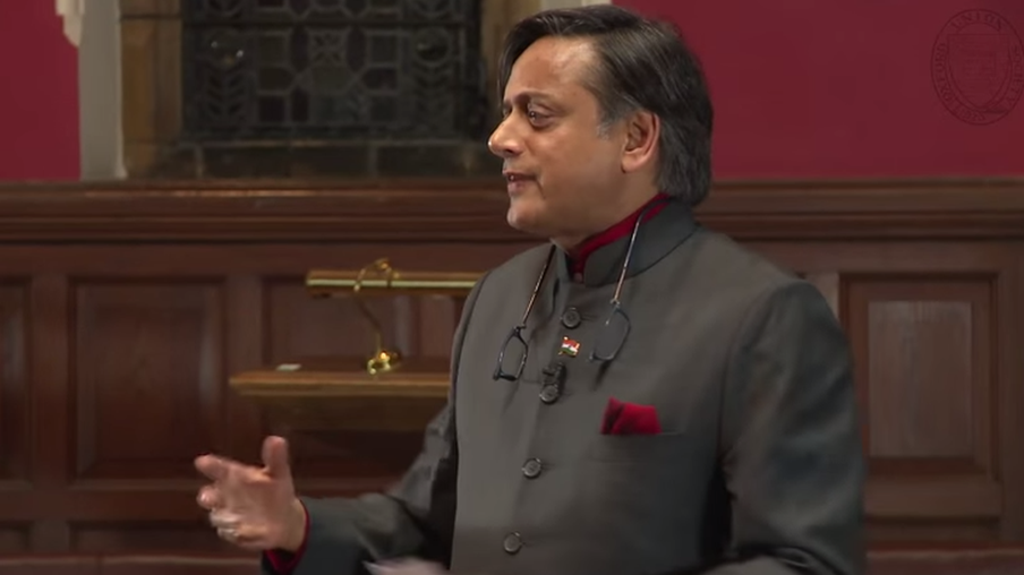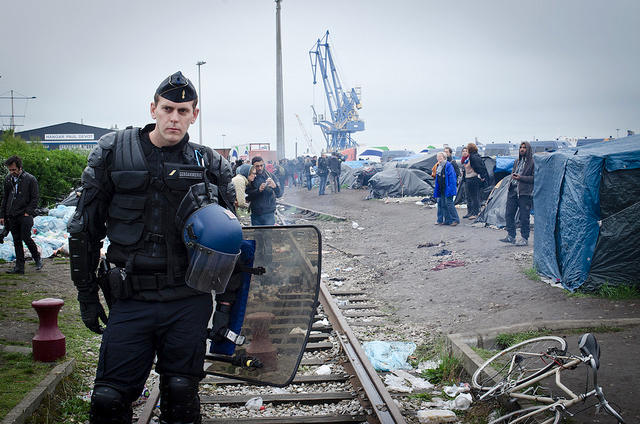Congress Party lawmaker Shashi Tharoor has gone viral with an Oxford Union speech in which he outlines a case for British reparations to India (and, implicitly, other South Asian countries.) Commentators have gleefully reproduced the Tharoor’s finest moments, including flamboyant insults against his opposition. “No wonder that the sun never set on the British Empire,” Tharoor commented wryly, “because even God couldn’t trust the English in the dark.”
He is correct on many points, but owing to his background as a cosmopolitan liberal, hesitates from a substantive economic critique that could answer the question of what form British reparations would actually take. Tharoor is on the right track when he requests a formal apology, if only because the $3 trillion price tag of British colonialism in South Asia is unrealistic to demand.
However, fully unraveling the United Kingdom’s imperial legacy means overhauling the political maelstrom that it unleashed. London cannot just admit guilt. It must also pledge itself to a much larger global transformation, which builds new political arrangements that can help end the postcolonial era.
First, it is worth revisiting some of Tharoor’s arguments. He begins by correctly noting that in spite of historians insisting that the British Empire was an agent of development and modernization, it is essentially undeniable that this only occurred after it savagely damaged the Indian economy.
The Empire presided over a deliberate and comprehensive deindustrialization of South Asia in order to erase it as a competitor, and turn it into an export destination for Victorian England. As Tharoor argues, India’s share of the world economy was 23% when British administration began in 1757. By the time the British left nearly two centuries later, the figure was 4%.
Like many post-colonial thinkers, Tharoor cites the case of Indian handloom weavers as an example of British policy at work. Basically, the Empire intricately destroyed local cloth manufacturing, wiping out the industry in India in order to support English factories. As a result, India became an importer of British-manufactured cloth, rather than a powerful exporter of the same product.
The argument that the British Empire “modernized” the Indian economy is an extremely tenuous one, and relies on nationalist denial of what actually happened. The objective was never to “modernize” it in a manner that was actually beneficial to the population. Rather, the Empire destroyed the Indian economy in order to make it servile to British interests, both as a market for its goods, and as a reliable supplier of raw materials. Inequality in South Asia remains shaped by these imperial decisions, which helped drive the ascendancy of the West at the expense of its many colonies, despite the modernization that they facilitated.
The latter point takes us to the British railway system in India, which is often defended as an example of how the Empire was a “mixed bag” that ultimately benefited South Asia.
This argument is ridiculous, since it ignores the actual point of the railways, and their fallout. Romantic journeys on the Darjeeling Limited were less important than the speedy trade routes that the new train lines made possible. Raw materials could get to important ports like Calcutta and Karachi, and British manufactured products could proliferate across South Asia. Any benefit to South Asians was a question of luck.
Tharoor notes quite strongly that rather than strengthening India, the railways were always designed to serve the imperial marketplace:
“In fact, the Indian railways were built with massive incentives offered by Britain to British investors, guaranteed out of Indian taxes paid by Indians, with the result that you actually had one mile of Indian railway costing twice what it cost to build the same mile in Canada or Australia, because there was so much money being paid in extravagant returns.
Britain made all the profits, controlled the technology, supplied all the equipment and absolutely all these benefits came as private enterprise — British private enterprise — at public risk, Indian public risk. That was the railways as an accomplishment.”
Unfortunately, Tharoor does not explore the social consequences of the railways, which begs a much larger discussion of how Westernization continues to devastate the countries of South Asia. This is to be expected. Tharoor is a Congress Party politician, and the Indian political elite continues to be enamored with neoliberal rhetoric of development-at-all-costs.
This omission undermines the entire speech. Tharoor ends with a request for an apology, which is useless if it ignores that British reparations must accompany an overhaul of the economic forces that the Empire unleashed. Otherwise, capitals like New Delhi, Islamabad, and Dhaka will continue to reproduce doctrines that they inherited from the British, and it will be difficult to say that the colonial period is definitively over.
This is a point that is often ignored, because it directly attacks elites who currently govern the subcontinent. In response to Tharoor, writer and editor Akhilesh Pillalamarri argues in The Diplomat that “the only substantive difference between Western imperialism and what came prior to it is the fact that Western colonialism occurred in tandem with the industrial, scientific, and political revolutions, all of which eventually shook up non-Western societies in unprecedented ways relative to their tradition arrangements.” It is implied that this was a net-positive, and despite the popularity of Tharoor’s speech, many South Asian elites continue to agree, for a variety of complicated reasons (not the least of which is the continued strength of British education in the subcontinent).
The British Empire is often defended because it was an agent of development in South Asia. Many leftists agree, while fiercely criticizing the severe exploitation that characterized the period. Karl Marx, for example, penned an interesting attack on British rule in the New York Daily Tribune, in 1853.
The piece accepted many imperial arguments about modernizing South Asia, and went further to argue that development would unlock future utopia by opening a new phase of industrial history on the subcontinent. “England has to fulfill a double mission in India,” Marx wrote. “One destructive, the other regenerating the annihilation of old Asiatic society, and laying the material foundations of Western society in Asia.”
Marx was reproducing a view on South Asian economic development through colonialism that continues to be popular, which is that its preindustrial history needed to be wiped out in favour of liberal republicanism and the capitalist form of production. He acknowledged the devastation that was occurring in South Asia as a result of the British Empire, but saw possible benefits as well. “Modern industry, resulting from the railway system, will dissolve the hereditary divisions of labor, upon which rest the Indian castes, those decisive impediments to Indian progress and Indian power.”
The problem with Marx’s argument is its historicism, and implication that the British Empire needed to “effect a progress” by “dragging individuals and people through blood and dirt, through misery and degradation.” Tharoor is correct to humorously point out that “many countries have built railways and roads without having had to be colonised in order to do so.”

Marx also fails to understand that “by breaking up the native communities, uprooting the native industry, and levelling all that was great and elevated in the native society,” the British were creating a situation in which a brutally suppressed South Asian past would come roaring back into the present through spontaneous violence and uprising. This occurred four years after the publication of Marx’s article with the Sepoy Revolt of 1857, and continues to affect South Asian politics today, with various movements ranging from the Taliban to the Naxalites.
This pattern of unrest is a direct result of the British Empire, which gave South Asian elites the productive and intellectual capacities to pursue policies that lead to fierce backlash of all ideological stripes. British rule was like a fairytale of an arrogant sorcerer who, through his incantations, summons demonic forces beyond his control. In South Asia, the postcolonial reality has been that when politicians like Tharoor smugly admonish their former colonial masters, they continue to create the same problems, in spite of the horrors that they unleash.
How, then, should we discuss the question of British reparations? It is likely impossible without a comprehensive willingness to seize the uncontrollable forces that the Empire unleashed, in order to subordinate them to local interests, rather than the post-imperial global economy. The “industrial, scientific, and political revolutions” that Pillalamarri discusses must be recast in new social frameworks. An apology would be a step in the right direction, but only as part of a movement that explicitly sets out to heal the massive wounds inflicted by the evolution of the world marketplace.
We are far from that point. Readers would be interested to learn that for all his polemics against the British Empire, Tharoor has been severely admonished by Congress Party leader Sonia Gandhi for praising Indian Prime Minister Narendra Modi’s Clean India Mission. This was driven by oppositional politics, as well as Tharoor’s apparent refusal to acknowledge that despite the necessity of holding Indian infrastructure to higher standards of cleanliness, Modi is only embarking on the initiative to make India more amenable to market-driven interests.
Since his election, mainstream politicians like Tharoor have been hesitant to fully condemn Modi’s Hindutva platform of religious and economic fundamentalism. This directly attacks the legitimacy of his speech, since Modi’s ideological motivations, as well as his current popularity, are both a reaction to British hegemony on the subcontinent, and also perpetuate many of its dynamics. It is worth noting that for all its anti-colonial swagger, Tharoor’s speech was actually endorsed by Modi, making the critical audience wonder about why Indian elites clearly don’t find the rhetoric threatening.
Marx wrote 162 years ago that “when a great social revolution shall have mastered the results of the bourgeois epoch, the market of the world and the modern powers of production, and subjected them to the common control of the most advanced peoples, then only will human progress cease to resemble that hideous, pagan idol, who would not drink the nectar but from the skulls of the slain.”
There is something to be said for this analysis, despite the problems inherent in “the most advanced peoples.” The British Raj may have collapsed, but the South Asia that it built continues to exist. Reparations must take the form of London being willing to play its role in helping to disassemble it. Otherwise, we will continue to be trapped by the failings of British-inspired governance, and forever a former English asset.
Photograph courtesy of Bo Jayatilaka. Published under a Creative Commons License.





